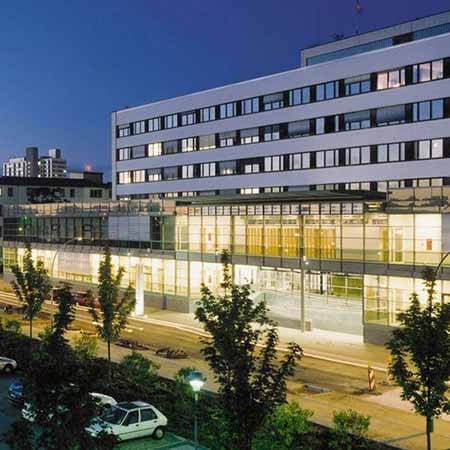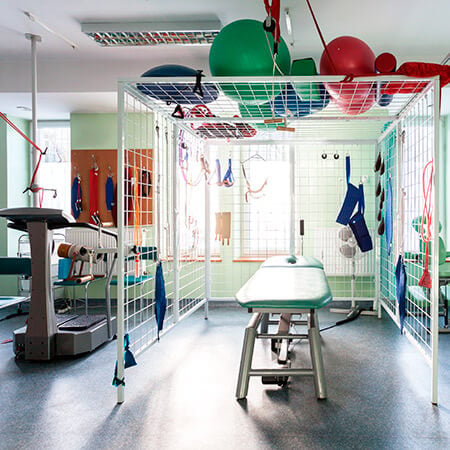Alzheimers disease
Alzheimer’s disease is the most widespread neurodegenerative brain disease. This pathology mostly affects elderly people. Alzheimer’s disease is the most common reason of dementia. About 40% of all cases of acquired dementia occur due to Alzheimer’s disease.
The Booking Health portal presents 56 German clinics specializing in Alzheimers disease treatment
Show all clinics
Alzheimer’s disease – Diagnostics
The anamnesis data and the results of the neurological examination are the basis of Alzheimer’s disease diagnostics. Doctors use the following diagnostic criteria:
- Decrease in the memory, mainly as for current and recent events
- Absence of the focal neurological signs
- Decreased intellectual ability
- Full consciousness
- Changed social behavior
Diagnosis is considered to be confirmed if all or a part of the mentioned symptoms are present during 6 months or longer.
According to the laboratory and instrumental tests, doctors can detect additional signs of Alzheimer’s disease, for instance:
- Increased level of tau protein and fragments of the amyloid protein in the cerebrospinal fluid
- An increase of slow wave activity in the posterior cortex of the brain recorded by EEG
- CT and MRI are used for the differential diagnostics (can exclude other possible illnesses that can also lead to dementia)
Certain university hospitals use PET (positron emission tomography) for reliable diagnostics of Alzheimer's disease during the patient’s life. Contrasting agent is injected into the patient’s body. The substance is accumulated in the amyloid plaques and reveals the brain areas affected by the pathological process.
Best clinics for the Alzheimer’s disease diagnostics in Germany:
Alzheimer’s disease – Treatment
Alzheimer’s disease is treated with drugs. Neuroprotective drugs are prescribed to slow the progression of neurodegenerative processes. Symptomatic treatment is performed, as well, allowing the patient to maintain social skills, cognitive functions, and ability to look after himself as long as possible.
Nowadays, there are no treatment techniques that proved their effectiveness for slowing down the Alzheimer’s disease development. However, many drugs and therapeutic approaches exist that are still being researched. It is likely that in the near future some of them will be used in German hospitals and other countries with the advanced medicine.
The most promising among the latest treatment methods are:
- Vaccination. A patient is injected with a medicine containing amyloid protein antigens. This allows the immune system to attack dangerous protein deposits in the brain and thereby prevent the death of nerve cells.
- Monoclonal antibodies are artificially synthesized proteins that are presupposed to influence the disease course as they reduce the amyloid protein deposits.
- Stem cells are used to replace the damaged neurons. Stem cells are obtained from the patient’s blood. They are differentiated into the nerve cells in laboratory conditions and then are injected back into the patient’s body.
Immunotherapy for Alzheimer's disease
So far, all immunotherapy methods for Alzheimer's are considered experimental. The widespread use of immunotherapy for Alzheimer's disease in clinical practice will begin after the completion of studies. However, specialized medical centers in developed countries already use immunotherapeutic treatment methods. The most promising immunotherapy methods include amyloid-specific antibodies, an Alzheimer's disease vaccine targeting amyloid beta, and dendritic cell-based vaccines.
Stem cells for the treatment of Alzheimer's disease
Any other cells can be formed from stem cells (SCs). Therefore, stem cell therapy can be used for any disease that is accompanied by tissue destruction.
So far, stem cell therapy for Alzheimer's disease treatment is being used as part of clinical trials. The procedure has already proven itself well. It is a safe treatment method that slows down the development of the disease by stimulating tissue regeneration. SCs restore connections between neurons, reduce the inflammatory process, and can themselves differentiate into nerve cells.
We also recommend that you watch the video on our YouTube channel "Booking Health", where the leading specialists of the specialized clinic talk about the advantages and peculiarities of stem cell therapy.
Best clinics for the Alzheimer’s disease treatment in Germany:

Beta Clinic Bonn

Bundeswehr Hospital Berlin

Charite University Hospital Berlin
Alzheimer’s disease – Rehabilitation
The most modern rehabilitation programs are used in Germany. They are adapted individually for each patient, and are based on the disease stage, age, physical possibilities, and the results of the conducted treatment. Different specialists such as: therapists, neurologists, psychologists, rehabilitators, kinesiotherapists, physiotherapists are involved in the rehabilitation process.
The following methods of rehabilitation are used:
- Dosed physical activity
- Training on the simulators and in the pool
- Physiotherapy
- Acupuncture
- Manual therapy
- Microcurrent therapy
- Natural factors of the nature (mud, thermal waters, etc.)
- Cognitive training and cognitive rehabilitation
Rehabilitation may include medicamentous support for improvement of cerebral blood circulation. Also, it is necessary to hold a consultation with the patient and his relatives about the way of life which is necessary for him in the current situation.
Rehabilitation programs in Germany are designed for 2 weeks. If necessary, they can last much longer. In this country, the patient is provided with qualitative care, accommodation in comfortable rooms and individually selected meals. Rehabilitation programs in Germany show one of the best results in the world.
Best clinics for neurological rehabilitation in Germany:
Authors:
The article was edited by medical expert, board certified Dr. Nadezhda Ivanisova. For the treatment of the conditions referred to in the article you must consult a doctor; the information in the article is not intended for self-medication!
Sources:
Journal of Neurology, Neurosurgery and Psychiatry
The cost of services includes
Here you can find the cost of treatment for this disease at the German University Hospitals. Leave a request and we will provide a free consultation with a doctor and will start organizing the whole treatment process.
The program includes the following:
- Issuing of an invitation for getting a visa for treatment as quick as possible
- Fixing an appointment at a time convenient for you
- Preliminary organization of a comprehensive examination and discussion of the forthcoming treatment plan
- Arranging transfer from the airport to the hospital and back to the airport
- Provision of interpreting services and services of a personal medical coordinator
- If necessary, assistance in the organization of further surgical treatment
- Provision of a medical insurance against treatment complications covering up to 200,000 euro
- Preparation and translation of medical records and recommendations from the hospital
- Assistance in the subsequent communication with your attending physician, including consultations on repeated X-ray images through the unique medical document management system E-doc


